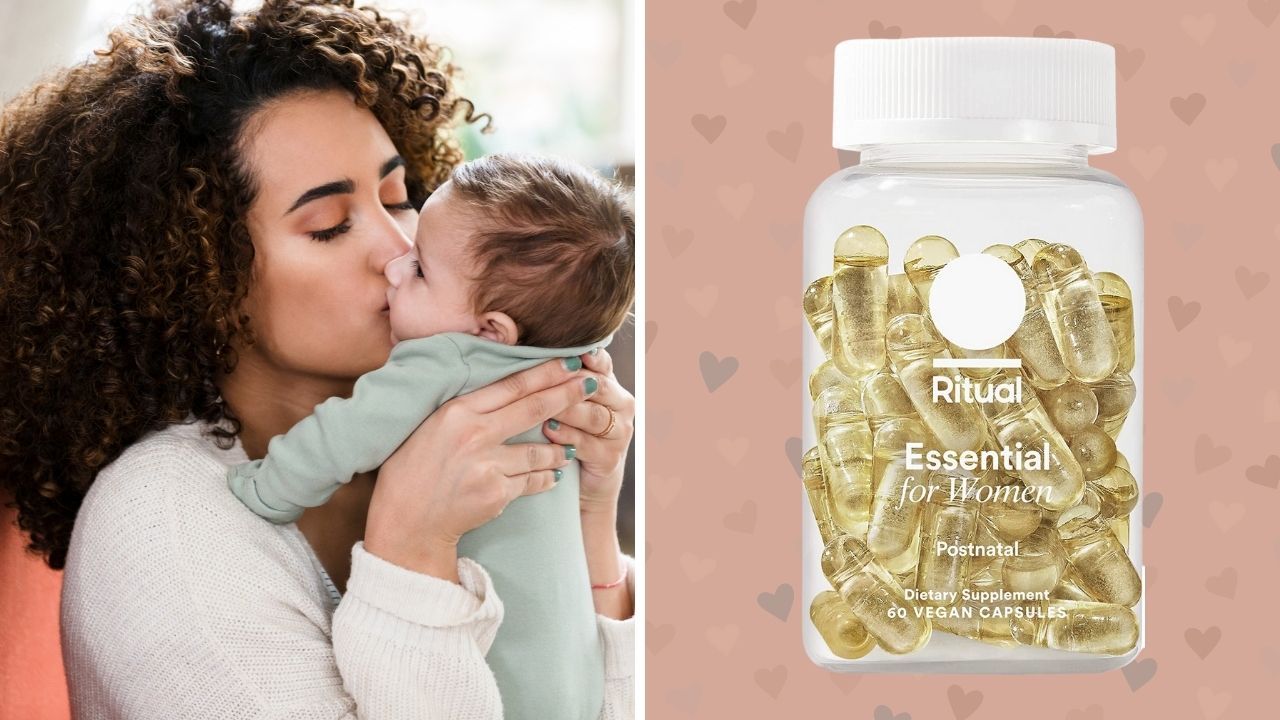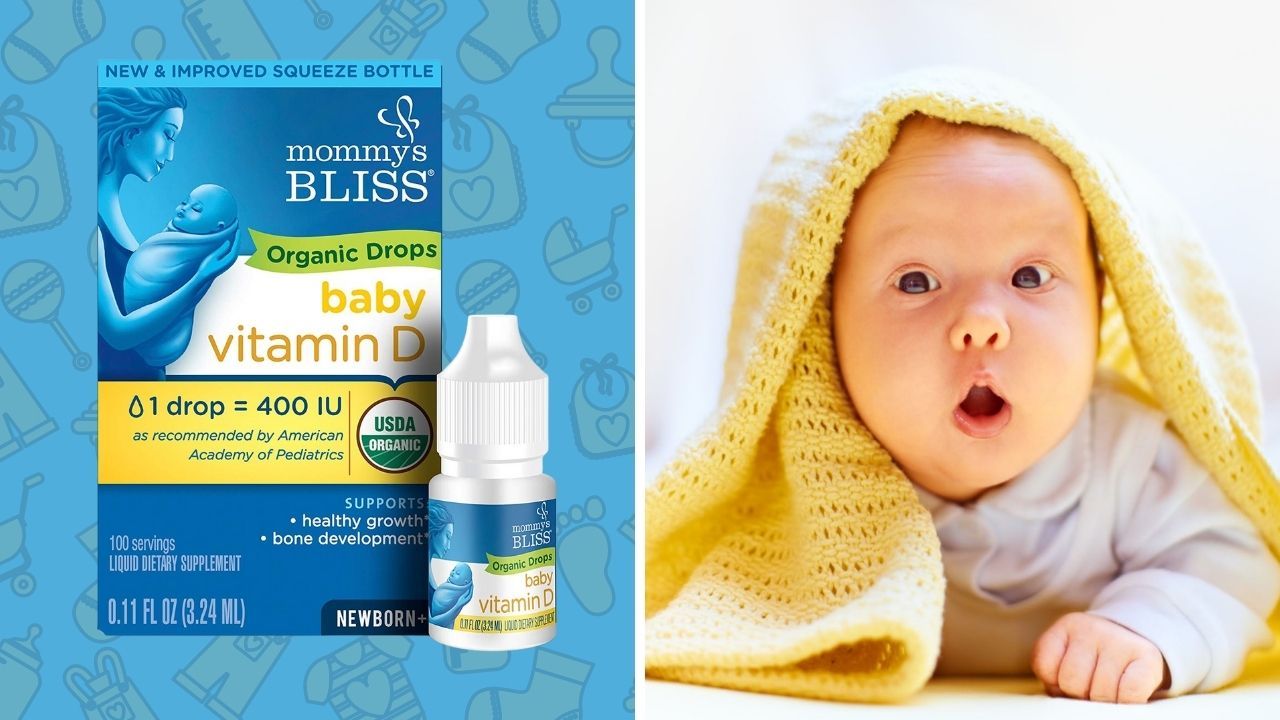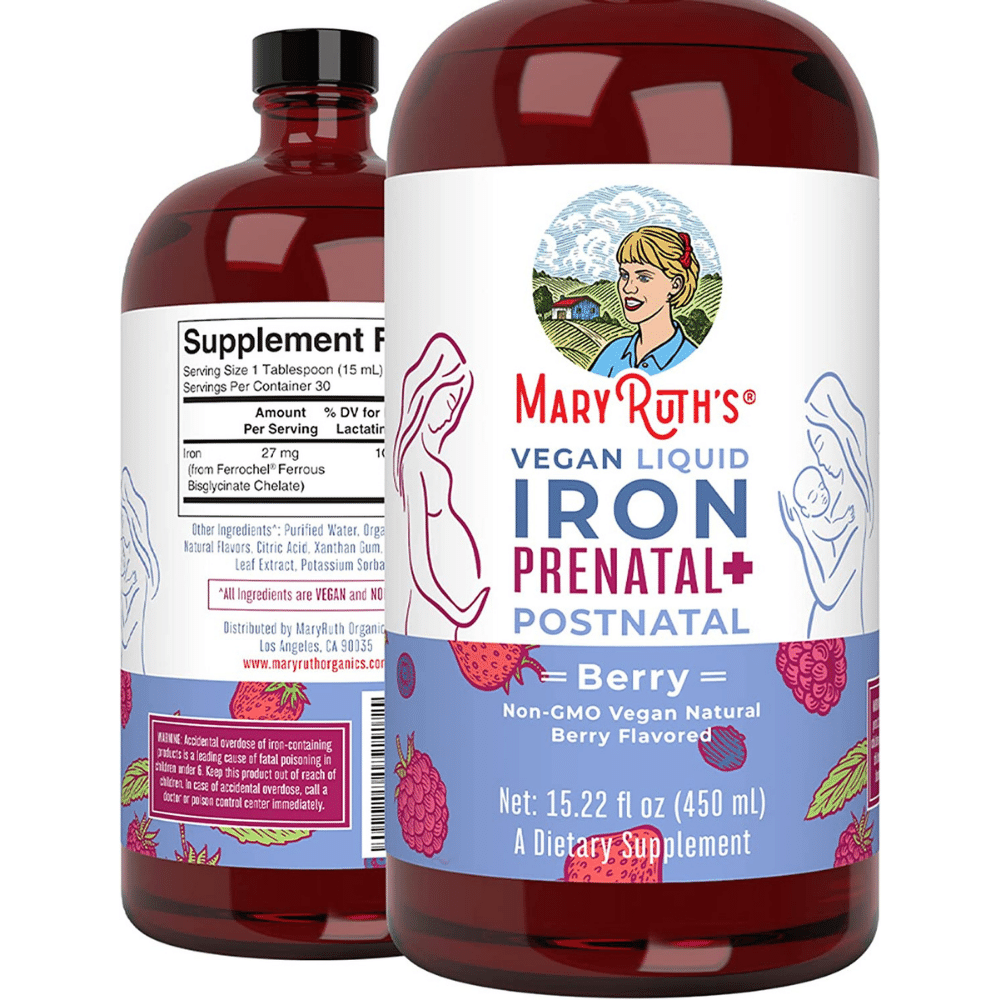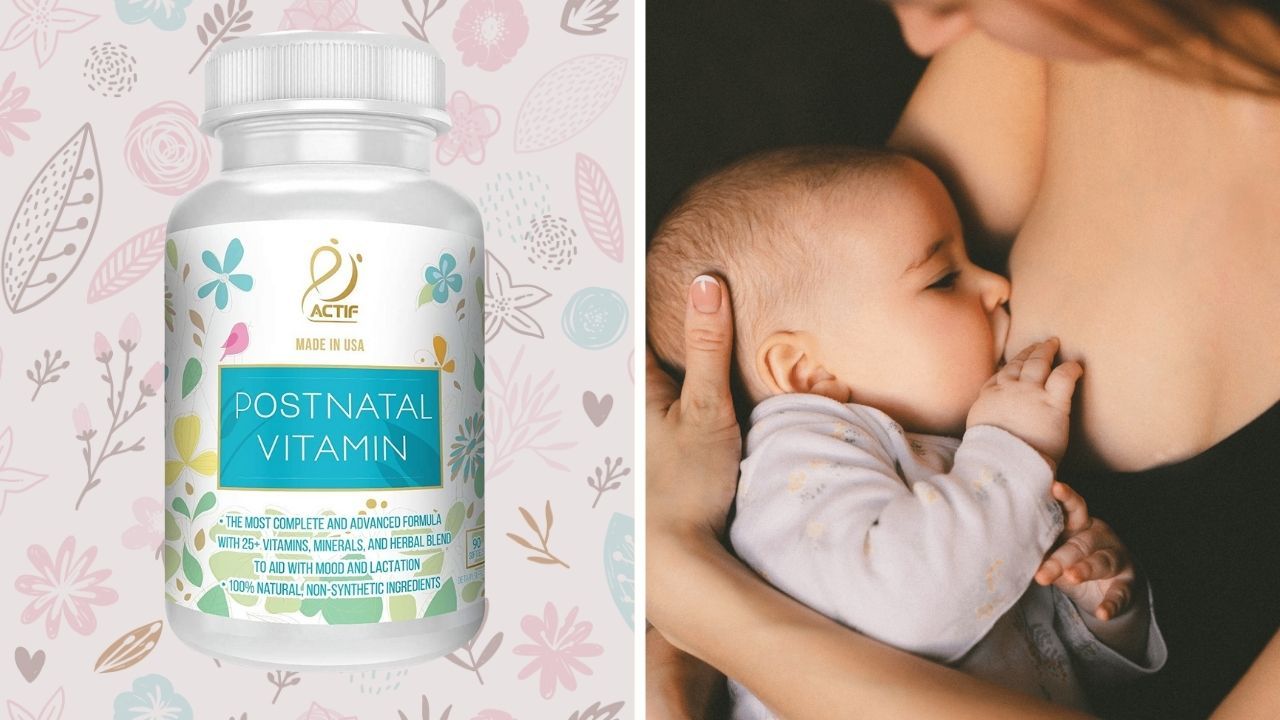
Best Vitamins For Breastfeeding | Keep Your Baby Healthy!
I know how important it is to get the right nutrients for myself and my baby, and that's why I want to share with you the best vitamins for breastfeeding.
Congratulations on your new addition!
Breastfeeding is a great way to nourish and bond with your new baby, but it can be hard to know where to start.
That’s why we’ve put together this list of the best vitamins for lactating mothers.
Taking care of yourself while you take care of your little one is so important. With the right vitamins, you can make sure that you’re getting all the nutrients you need to stay healthy and happy.
Keep reading to learn more about our top vitamin picks for nursing mothers!
How We Picked
Mama, I know you're busy. Between taking care of your little one and juggling work and everything in between, it's hard to find time for yourself.
It can be tough to make sure that you're getting all the nutrients you need when you're short on time and energy. Even if you're eating a balanced diet, you may not be getting all the key vitamins and minerals your child needs from food alone.
A good prenatal vitamin can help bridge those gaps and give both you and your child the nutrients you need.
Disclosure: We only recommend things we’ve personally used or come highly recommended by trusted peers. Using one of our referral links might give us a small commission which helps support this website at no additional cost to you. If you’d like to learn more check out our disclaimer page.
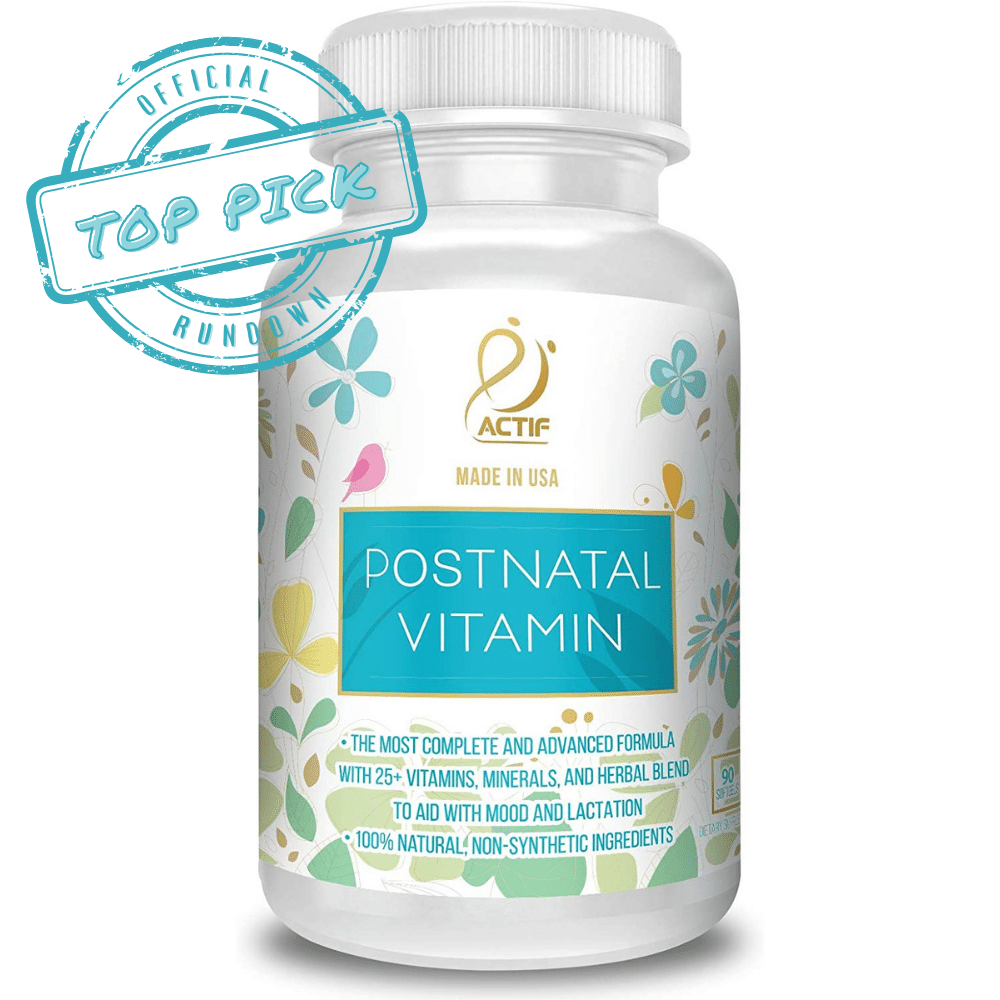
Actif Organic Postnatal Vitamin
Best postnatal vitamins for nursing mothers and babies.
Why We Chose
Pregnancy and breastfeeding can put a lot of demands on a woman's body, which is why it's important to make sure you're getting enough of the right nutrients.
Iron helps to prevent anemia, which can be exacerbated when a woman loses blood during delivery.
Calcium is needed for the mom's and baby's bones, so getting enough while breastfeeding is important.
Not only do infants need vitamin D for healthy bones and teeth, but the nutrient also impacts women's brain function, immunity, hormones, and mood.
Choline is a nutrient that plays a role in nerve function, muscle movement, metabolism, energy, and several other important body processes.
Actif Organic Postnatal Vitamin provides you with Iron, Calcium, Vitamin D, and Choline to help you stay healthy and strong during pregnancy and breastfeeding.
The Rundown
This advanced, organic postnatal vitamin can help increase breast milk production by up to 50%.
- This vitamin is specifically designed to meet the needs of nursing mothers and is packed with nutrients that are essential for both you and your baby.
- Actif Organic also contains Biotin which has been shown to help with postpartum hair loss.
- This vitamin has been voted the most trusted brand by women's health specialists in 2021 and 2022.
So if you're looking for a vitamin that will give you the best possible nutrition, be sure to try this one. You and your baby will be glad you did!
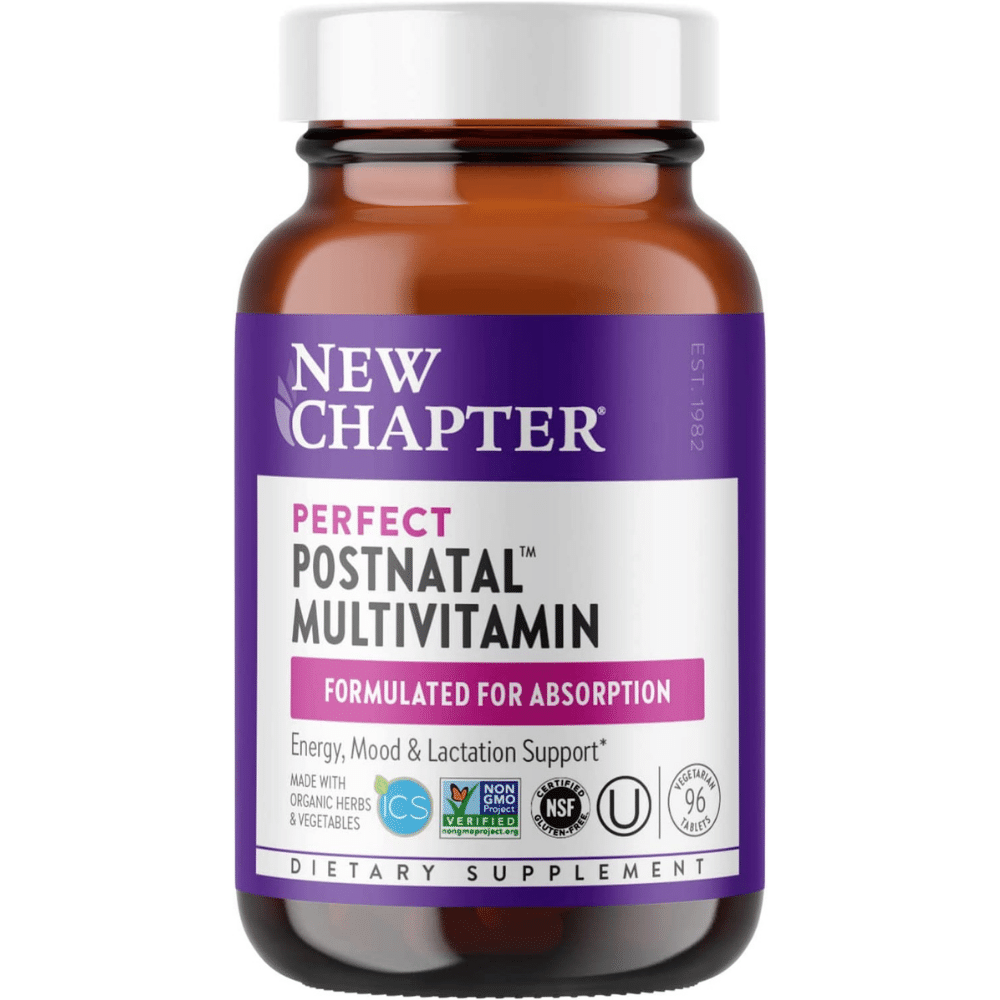
New Chapter Perfect Postnatal Multivitamin
Best for energy, mood, and lactation support.
Why We Chose
This postnatal vitamin & mineral supplement is expertly formulated to support lactation, energy levels, and mood. It's also gentle on your stomach and contains beneficial probiotics.
And because New Chapter only uses clean, pure, whole-food ingredients, you can be sure you're getting all the nutrients you need to support your body during this demanding time.
The Rundown
When it comes to nourishing your body during pregnancy and postpartum, you want to make sure you're getting the best possible ingredients.
- Pure, whole-food ingredients like organic superfoods like Turmeric, Oats, and Kelp are essential.
- These vitamins are made with Certified Organic Vegetables & Herbs, Non-GMO Project Verified, Vegetarian, Certified Kosher, Certified Gluten Free, and No Synthetic Fillers or Animal Gelatin which are added to some prenatal gummy vitamins.
- This expertly formulated supplement is gentle on your stomach and fermented with beneficial probiotics.
- It's also a 3-in-1 Complete Formula: Multivitamin, Multimineral & Multiherbal - everything you need in one convenient supplement.
So you can feel confident you're giving your body the nutrients it needs to thrive during this special time.
Why We Chose
Women need to get enough iron, especially during pregnancy and after birth. Iron helps prevent anemia, which can be more severe when a woman loses blood during delivery.
The daily recommended intake of iron for lactating women is 27 milligrams. If you have low iron levels taking a separate iron supplement for six to eight weeks after delivery can be extremely beneficial to you and your baby.
The Rundown
Liquid Iron is an essential mineral needed in greater quantities during pregnancy.
- It is a critical component of hemoglobin, a protein of red blood cells, and myoglobin, a protein of muscle cells.
- The liquid comes from bioavailable Ferrochel, a unique form of Iron that may have higher absorption rates and increased tolerability than Iron salts.
- This liquid supplement is easy-to-take and has a delicious berry flavor.
- It supports overall health & wellness for the mom while supporting the cognitive development of the baby.
Prenatal + Postnatal Liquid Iron is a great way to ensure you are getting the recommended amount of Iron during pregnancy.
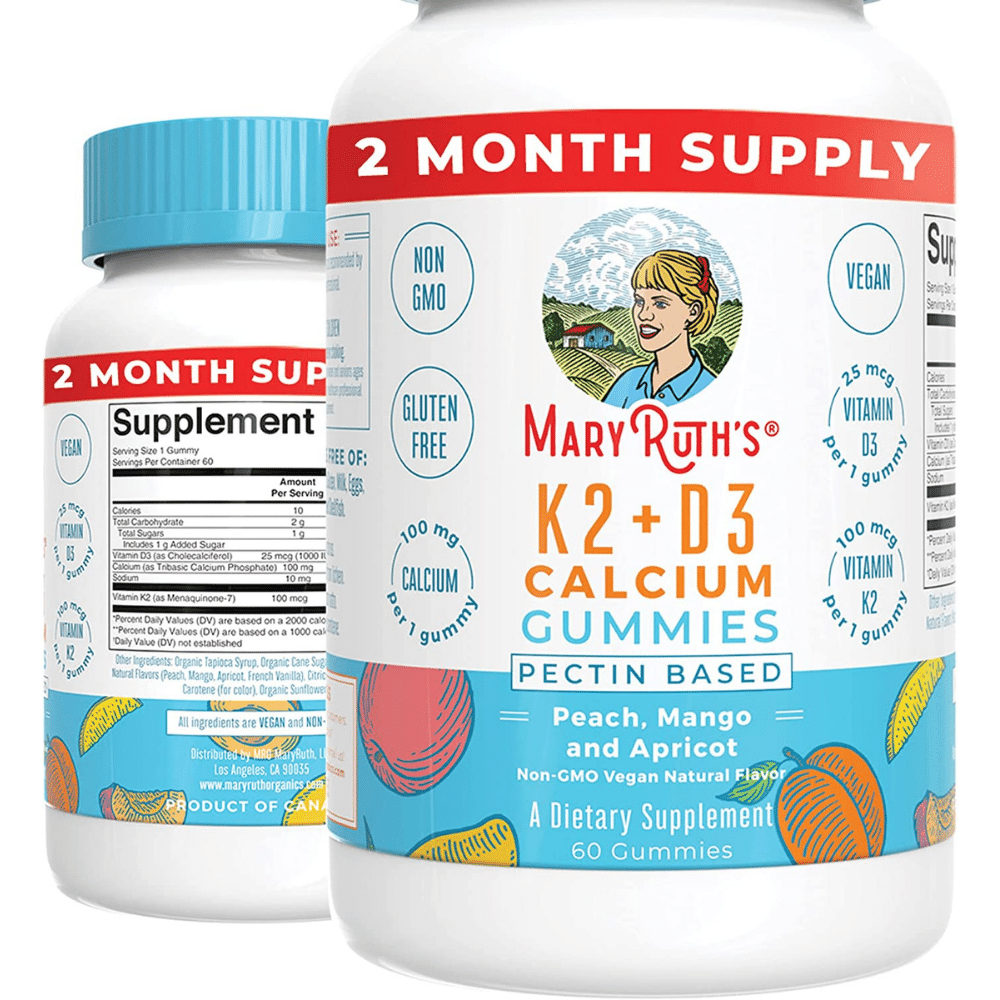
MaryRuth's Calcium with Vitamin D3 & Vitamin K2
Best postnatal gummy vitamins for Calcium deficiency.
Why We Chose
Most people know that calcium is important for strong bones and teeth. However, few realize that this essential nutrient also plays a vital role in other aspects of health.
Calcium is necessary for the proper function of the circulatory, muscular, and nervous systems.
Additionally, pregnant and lactating women need 1,000 milligrams of calcium per day to support the health of their babies. Vitamin D is another important nutrient for pregnant and breastfeeding women.
Not only does it play a role in the development of infants' bones and teeth, but it also impacts brain function, immunity, hormones, and mood.
Breastfeeding women should get about 600 international units (or 15 micrograms) of vitamin D per day to maintain their health and well-being.
The Rundown
Looking for a vegan option for your daily dose of vitamins D3 and K2? Look no further than these delicious gummies from MaryRuth's.
- Made from non-GMO, vegan lichen, and natto, these gummies are free of common allergens like dairy, nuts, gluten and wheat, soy, corn, and nightshades.
- They're also easy to chew, so you don't have to worry about struggling to swallow pills.
- These gummies are made with three delicious fruit flavors in one: peach, mango, and apricot.
- Vitamin D3 is essential for calcium absorption and keeping your bones strong and healthy. University studies have shown that combining vitamins D3 and K2 can help prevent arterial blockages.
Keep your bones strong and healthy and your arteries clear with this convenient and delicious option.
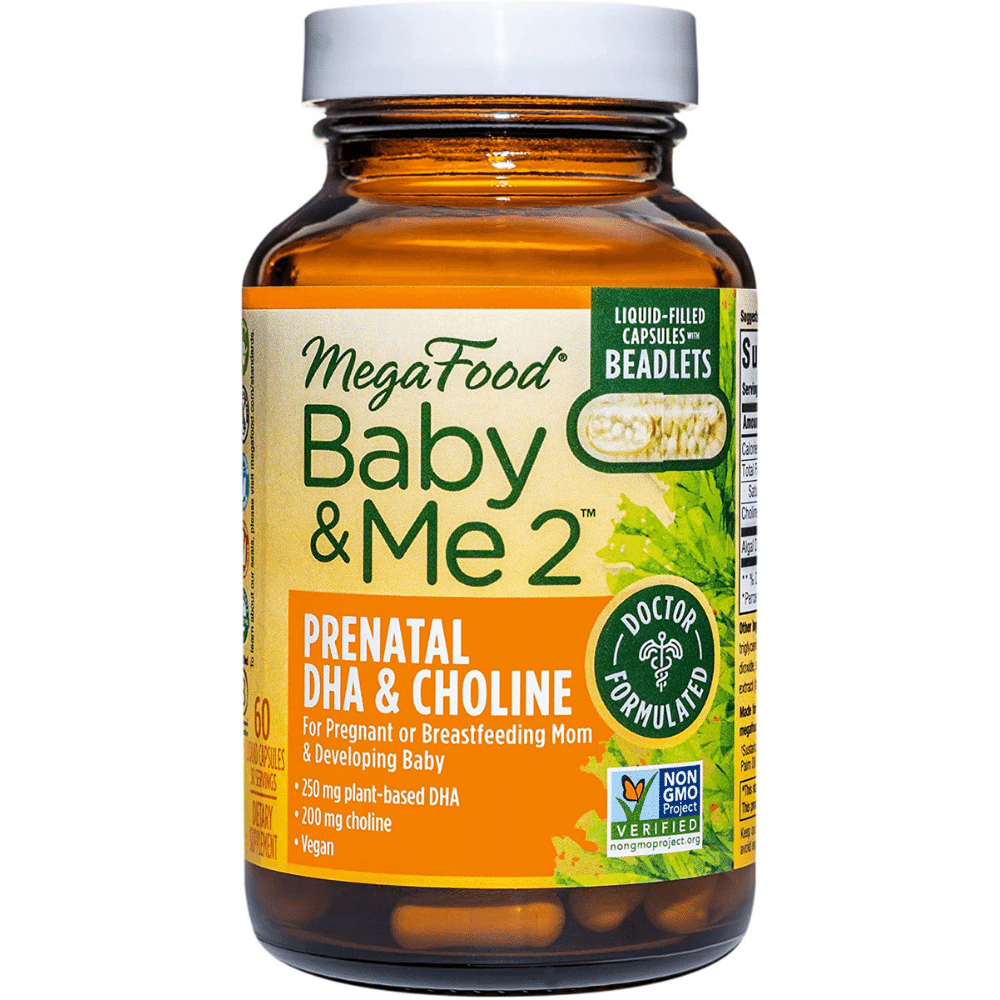
MegaFood Baby & Me 2 Prenatal DHA & Choline
Best for those deficient in DHA and Choline.
Why We Chose
DHA is an essential fatty acid that supports infant development.
Studies suggest that there are long-term benefits for infants with higher levels of DHA, including faster development of behavioral functions. Deficits in DHA may lead to learning impairments among infants.
Babies get DHA through breast milk, so mothers need to make sure they get enough of the fat in food or supplement form. It is recommended that lactating women need between 300–900 milligrams of combined DHA per day.
Choline plays a role in nerve function, muscle movement, metabolism, and energy. The recommended daily intake for women who are breastfeeding is 550 milligrams of choline.
Though both DHA and choline are essential for infant development, it's important to note that too much of either one can be harmful. Therefore, pregnant and breastfeeding women need to speak with their healthcare provider about how much DHA and choline they should be getting.
The Rundown
DHA is an essential fatty acid that plays a role in brain development, and choline is a nutrient that helps support healthy brain function.
- While you can get some DHA and choline from food, supplements can help ensure you're getting enough of these nutrients.
- This Doctor-formulated Vegan DHA + Choline is a plant-based supplement that provides 50 mg of DHA and 200 mg of choline.
- The DHA is derived from algae, and the choline is in the form of slow-release beadlets that are released over some time.
- The supplement is also encapsulated in a vegetable capsule, making it easy for your body to absorb the nutrients.
Whether you're pregnant, breastfeeding, or just looking to support your overall health, MegaFood Baby & Me is an excellent way to get the DHA and choline you need.
What Exactly Are Postnatal Vitamins?
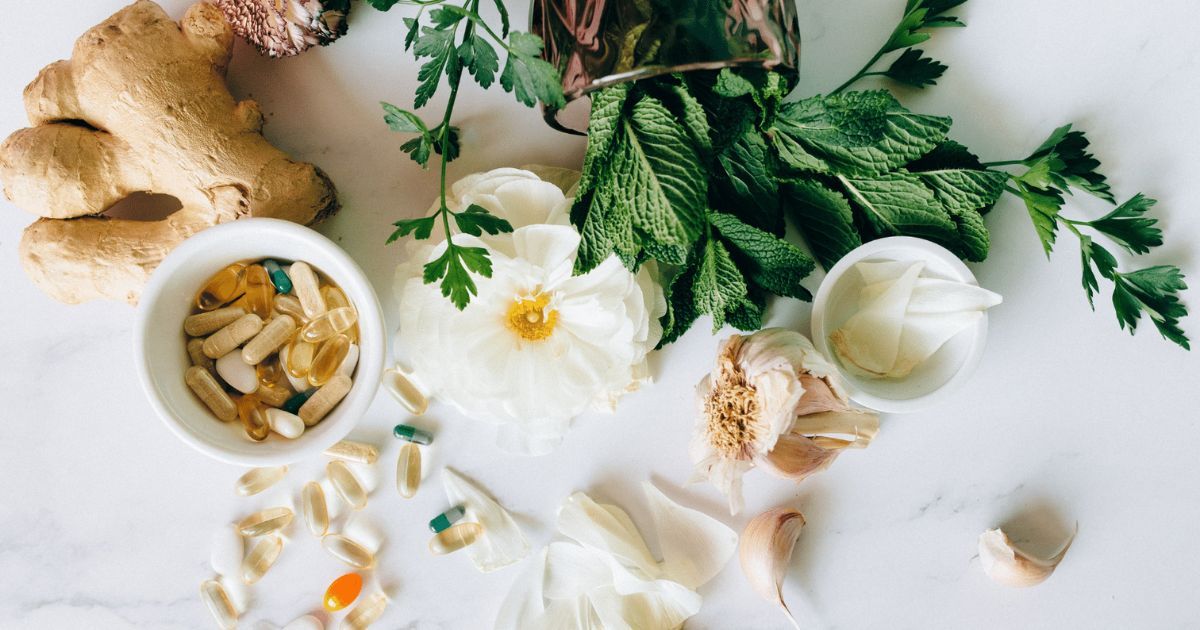
The postnatal period is a vital time for a woman’s body to recover and heal from the rigors of pregnancy and childbirth.
However, certain vitamins and minerals are particularly important during this time.
- Iron helps to prevent fatigue and can be found in leafy green vegetables, legumes, and lean red meat.
- Vitamin B6 is essential for hormone balance and is found in poultry, fish, and whole grains.
- Breastfeeding women need extra vitamin C to support milk production, and this vitamin can be found in citrus fruits, tomatoes, and broccoli.
- Folic acid helps to prevent birth defects and can be found in leafy green vegetables, legumes, and nuts.
By including a variety of these foods in their diet, postpartum women can ensure they’re getting the nutrients they need to support their health during this crucial period.
- Prenatal vitamins are an important part of a pregnant woman's diet, but they can also be beneficial during the postpartum period and while breastfeeding.
- These vitamins help to replenish the nutrients that are lost during pregnancy and childbirth, and they also help to support the mother's body as it recovers from the stress of labor.
In addition, prenatal vitamins can help to promote milk production and prevent postpartum depression. For these reasons, it is recommended that women continue to take prenatal vitamins during the months after birth.
Benefits Of Taking Vitamins While Breastfeeding

Postnatal vitamins are highly beneficial just as a prenatal supplement is during pregnancy.
They provide the nutrients that women need to heal and recover from childbirth and help to maintain a healthy balance of all macro- and micronutrients. They also help to fill any gaps in your diet that might be causes of nutrient deficiencies.
Postnatal vitamins play an important role in:
- Hormone balance
- Breast milk supply
- Mood
- Brain function
- Energy levels
Postnatal vitamins for breastfeeding include:
- Iron
- Calcium
- Vitamin D
- Choline
- DHA
These vitamins are crucial for postpartum women. If you're breastfeeding and want to ensure that you're getting all the nutrients you and your baby need, then it's especially important to take a high-quality postnatal supplement.
Talk to your doctor or midwife about which best postnatal vitamin is right for you.
Best Vitamins for Breastfeeding FAQs
It can be hard to know which vitamins are best for you when you're breastfeeding.
It's normal to have questions about breastfeeding, especially since it can be so different for each mother and child. You want to make sure you're doing everything you can to provide the best possible nutrition for your little one.
Check out our FAQ section for answers to all of your questions about vitamins for lactating mamas.
What is the best multivitamin for breastfeeding mothers?
The best multivitamin for a breastfeeding mom will vary depending on the woman's individual needs, so there isn't a "one size fits all" answer to this question.
Some general tips, however, would be to choose a good multivitamin that contains high levels of Iron, is free of artificial additives and hormones, and is easy to digest.
In addition, it's a good idea to speak with your healthcare provider before starting any new supplements while breastfeeding. They can help you determine which products are best suited for your specific needs.
Do you need extra vitamins while breastfeeding?
Yes, extra vitamins are needed while breastfeeding. A balanced diet is important, but it's not always enough to provide all the nutrients your baby needs. That's why most doctors recommend taking prenatal vitamins while breastfeeding.
Eating a variety of nutrient-dense foods is the best way to get the right prenatal and postnatal vitamins and minerals for you and your baby.
In reality, many of us mamas are not getting enough from our diet, so talk to your doctor about taking a supplement. Just be sure to choose one that's specifically designed for nursing mothers.
What vitamins help breast milk?
If you're looking to boost your breast milk production, there are a few vitamins and nutrients that can help. Vitamin B6, vitamin B12, and vitamin D are all important for breast milk production.
Omega-3 fatty acids are also helpful in boosting breast milk production. Make sure you eat plenty of foods rich in these vitamins and fatty acids, such as salmon, eggs, and spinach.
By getting enough of these nutrients, you can help increase your breast milk production and provide your baby with the best possible nutrition.
What vitamins should I take after giving birth and breastfeeding?
Pregnancy and breastfeeding can take a toll on a woman's body, depleting her stores of essential nutrients like iron and vitamin D. That's why new moms need to make sure they're getting enough of these vital nutrients in their diet.
Iron is essential for transporting oxygen throughout the body, and a lack of iron can lead to fatigue and anemia. Foods high in iron include red meat, poultry, fish, legumes, spinach, and fortified cereals.
Vitamin D is important for calcium absorption and maintaining strong bones. Food sources of vitamin D include fatty fish such as salmon and eggs.
It's important to talk to your doctor before starting any new supplements to make sure you're getting the right nutrients for your postpartum body.
How can I increase my breast milk production?
If you're looking to increase your breast milk production, there are a few things you can do to help.
First, nurse or pump frequently. The more often you express milk, the more milk your body will produce.
Second, eat plenty of healthy foods. Eating a balanced diet will help ensure that your body has the nutrients it needs to produce breast milk.
Third, drink plenty of fluids. Staying hydrated is essential for producing breast milk.
And finally, get plenty of rest. A tired momma makes for a cranky baby, and that's no good for anyone! Getting enough rest will help ensure that you have the energy you need to produce breast milk.
So there you have it! A few simple tips to help increase your breast milk production.
Can vitamins affect breast milk?
While there are no specific vitamin requirements for lactating women, a healthy diet is still essential to ensure an adequate supply of nutrients for both the mother and her nursing infant.
Some vitamins and minerals, like calcium and vitamin C, are particularly important for breast milk production and boosting the immune system of both mother and child.
Breastfeeding mothers should eat plenty of fruits, vegetables, lean protein, and whole grains in their diets to get the nutrients they need.
By following a healthy diet, breastfeeding mothers can help to ensure that they and their infants are getting the vitamins and minerals they need.
What supplements should I not take while breastfeeding?
Breastfeeding mothers should avoid taking certain supplements. These include herbal supplements, such as St. John's Wort, and Vitamin A and Vitamin E.
These substances can be transferred to the baby through breast milk and may have adverse effects. If you're unsure about whether a particular supplement is safe to take while breastfeeding, it's always best to consult with your health care provider.
Being informed and taking precautions is the best way to ensure that your breastfeeding experience is positive for both you and your baby.
Can I take b12 while breastfeeding?
Both mama and baby need to get enough B12 while breastfeeding. B12 is essential for the development of the baby's brain and nervous system.
It's recommended that all pregnant and breastfeeding women take a supplement of at least 2.6 micrograms per day. You can get B12 from animal products like meat, poultry, fish, eggs, and dairy products.
That said, most women obtain optimal levels through diet. If you are a vegetarian or vegan, a B12 supplement would be highly beneficial. Check with your doctor to make sure you're getting enough B12.
Does folic acid increase breast milk?
There is some evidence to suggest that folic acid supplementation may help to increase breast milk production. However, the research on this is still limited, so it's not clear yet whether or not this is the case.
If you're looking to increase your breast milk production, there are a few things that you can do aside from taking folic acid supplements.
Making sure that you're eating enough healthy calories and proteins can help, as well as getting adequate rest. Breastfeeding frequently and drinking plenty of fluids can also boost milk production.
Remember, everybody is different, so what works for one person may not work for another. The best thing you can do is talk to your doctor or a lactation consultant to find your specific needs.
Should I continue to take folic acid while breastfeeding?
Although many different vitamins and minerals are important for pregnant women, folic acid is one of the most essential.
Folic acid helps to prevent birth defects in the baby's brain and spine. All women who could become pregnant are encouraged to take a multivitamin with 400 micrograms of folic acid every day.
Folic acid is found naturally in leafy green vegetables, legumes, and nuts, but it can also be taken as a supplement.
Pregnant women should consult with their healthcare provider to determine the best way to ensure that they are getting enough folic acid.
Bottom Line
While it is always best to get your nutrients from real food, the reality is that many of us struggle to get all the vitamins and minerals we need.
If this is the case, taking a supplement can help ensure that you and your baby get all the nutrients you need. There are a variety of supplements on the market, so it is important to choose one that is specifically designed for pregnant women.
These postnatal supplements usually contain a combination of vitamins and minerals, such as folic acid, iron, and calcium, which are essential for a healthy pregnancy.
With so many options available, it is important to do your research and talk to your doctor to find the right supplement for you.
Before You Go...
